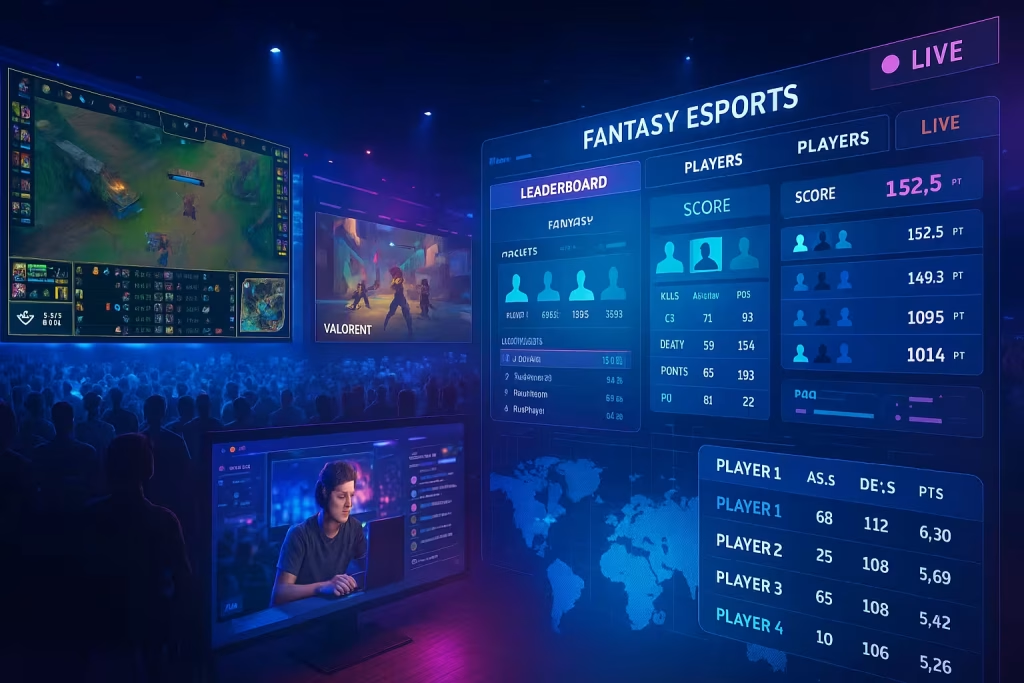The Future of Fantasy Esports: Where Skill Meets Gambling Regulation

What if the next big revolution in esports isn’t about watching stars on stage — but running them? Imagine building a fantasy roster of elite competitive gamers, leveraging stats, meta-shifts and live broadcasts to win real money. That’s the emerging frontier of fantasy esports — and it’s more than just a game. It’s where skill, data and regulation are about to collide.
In this article we’ll unpack how fantasy esports has grown, why it’s a pure skill game (or at least claims to be), how regulators are scrambling to adapt — and what it means for players, platforms and affiliates in the online betting world. If you’re in the business of traffic, tools or wagering content, this is a space you don’t want to miss.
What Is Fantasy Esports?
Fantasy esports takes the familiar format of traditional fantasy sports and drops it right into the competitive gaming arena. Instead of drafting quarterbacks or point guards, you’re picking your favorite pro gamers — players who compete in titles like League of Legends, Counter-Strike 2, Valorant, or Dota 2.
Just like in fantasy football, participants create a roster, track live stats, and compete against others based on how those real players perform in actual matches. The twist? Esports’ rapid pace, constant patch updates, and evolving metas make player performance far less predictable — and far more skill-driven. Success depends on how well you understand the game, the teams, and the current meta.
There are several popular formats used in fantasy esports:
- Daily Fantasy (DFS) – Short contests where users draft lineups for one day or one tournament round. Perfect for quick, high-energy play.
- Season-Long Leagues – Longer-term contests that mirror traditional fantasy sports, with trades, roster management, and cumulative scoring.
- Micro-Fantasy Games – Emerging trend allowing users to compete on specific matches, maps, or even rounds within a tournament.
And here’s where it gets even more interesting: most fantasy esports platforms emphasize skill-based decision-making. Choosing which players to draft isn’t random luck — it’s about analyzing past performance, understanding patch notes, following scrim rumors, and predicting which teams will adapt fastest.
That blend of analytics and instinct is what makes fantasy esports unique — it’s part data science, part gaming passion, and part gambling innovation.
The Rise of Fantasy Esports (2020–2025)

The last five years have been a breakthrough era for fantasy esports. What began as a niche side project for gaming superfans has evolved into one of the fastest-growing corners of the online wagering world.
When live sports paused during the pandemic, esports filled the entertainment vacuum. Twitch, YouTube, and live tournament platforms exploded with engagement, introducing millions of new fans to competitive gaming — and to fantasy-style play. Suddenly, viewers weren’t just watching matches; they were analyzing player stats, drafting fantasy lineups, and tracking performance in real time.
Fantasy esports has grown alongside esports betting, feeding off the same hunger for interactive, skill-based competition. Today, the audience isn’t limited to die-hard gamers. Investors, data analysts, and even traditional fantasy players have crossed over to this new digital arena.
Key drivers behind fantasy esports’ growth include:
- Mainstream Adoption: Major sportsbooks like DraftKings and FanDuel expanded into esports-based contests, legitimizing the category.
- Streaming Power: Twitch and YouTube made pro tournaments accessible to global audiences — complete with player analytics and live commentary.
- Tech Advancements: APIs now deliver live match data, allowing for real-time scoring and AI-powered player projections.
- Demographic Shift: Gen Z and younger millennials are more comfortable blending gaming, data, and betting — and they crave interactive, skill-driven experiences.
- Sponsorship & Investment: Brands from hardware to energy drinks now sponsor tournaments and fantasy contests, bringing in money and media coverage.
Fantasy esports is no longer just an offshoot of traditional fantasy sports — it’s carving its own identity. With every new patch, roster shuffle, or championship series, the game within the game becomes even more competitive, strategic, and monetizable.
Why Fantasy Esports Is a “Skill Game” (Not Just Gambling)
Fantasy esports often sits in the same conversations as sports betting — but legally and practically, there’s a critical difference. Most jurisdictions recognize a clear line between games of skill and games of chance. Fantasy esports, like daily fantasy sports before it, argues that success depends on the former.
The outcome of a fantasy contest isn’t random. Players who study the scene, analyze data, and understand in-game dynamics consistently outperform casual entrants. That’s why many platforms classify fantasy esports as a skill-based competition, not gambling — a distinction that determines whether the activity is regulated like sports betting or allowed under separate legal carve-outs.
The Elements of Skill That Define Fantasy Esports
What separates a skilled player from a lucky one comes down to research, pattern recognition, and predictive decision-making. Success relies on how well a user can translate gaming knowledge into smart roster choices.
Key skill factors include:
- Statistical Analysis: Tracking player performance metrics such as kill/death ratios, average damage output, and team win rates.
- Meta Awareness: Understanding how recent game patches, balance updates, or new characters shift player value.
- Roster Construction: Strategically balancing star players with budget picks to maximize overall points.
- Opponent Research: Evaluating upcoming matchups — for example, knowing which team struggles on specific maps or against certain compositions.
- Real-Time Adaptability: Adjusting lineups based on late roster changes, substitutions, or health updates before matches begin.
Each of these factors rewards study and experience rather than luck. Players who grind data, follow team news, and interpret the competitive landscape gain measurable edges over others.
Why the “Skill” Argument Matters
This classification isn’t just a marketing tagline — it’s a legal shield. In the United States, the Unlawful Internet Gambling Enforcement Act (UIGEA) of 2006 provided exemptions for fantasy sports contests based primarily on skill. Many states later expanded that logic to cover daily fantasy esports as long as they meet certain criteria:
- The prizes are predetermined and not based on odds.
- Outcomes reflect player performance, not random events.
- Contest operators don’t directly influence match results.
By leaning into skill, fantasy esports platforms can operate in regions that restrict traditional gambling. That legal nuance is why many startups in this space emphasize analytics tools, transparent scoring, and educational content — all of which reinforce the idea that knowledge, not luck, drives success.
Fantasy esports might look like betting from the outside, but at its core, it’s data science meets game strategy. The more you know, the more you can win — and that’s exactly what keeps it in the “skill” column.
The Regulatory Gray Zone

When it comes to Esports fantasy contests, the regulatory landscape is anything but clear. These games fall into a borderline category—too similar to wagering for some regulators, yet positioned as skill-based for others. That uncertain status presents both opportunity and risk for operators, affiliates and players alike.
Why the Uncertainty?
- At the federal level in the U.S., the Unlawful Internet Gambling Enforcement Act of 2006 (UIGEA) includes a carve-out for so-called “fantasy or simulation sports” contests that are predominantly skill-based. This signals approval of fantasy formats under certain conditions.
- Yet each U.S. state regulates gaming differently. Some states have explicit fantasy-sports laws, while others lump fantasy contests under broader gambling or wagering legislation.
- The very nature of fantasy esports – blending real-match results, digital teams, prize incentives – blurs the line between “game of skill” and “game of chance.” That ambiguity creates regulatory risk.
- For an up-to-date breakdown of state-by-state regulation, see our full guide on our U.S. Online Gambling Laws page.
Key Regulatory Factors to Track
Here are the major variables that determine whether a fantasy esports contest falls into safe “skill-game” territory — or into the realm of regulated gambling:
- Prize structure and entry fee: If the contest requires a purchase or stake and offers large cash prizes, it may resemble wagering.
- Outcome drivers: The more outcome depends on player performance, meta knowledge and strategic roster choices (rather than random events), the stronger the “skill” argument.
- Operator role: If the platform merely facilitates participant competition and does not manipulate odds, the case for skill-based design strengthens.
- State law definitions: Some states explicitly define fantasy contests as excluded from sports wagering, while others do not. For example, in California the Attorney General recently issued an opinion declaring daily fantasy sports contests illegal under state statute.
- Regulatory precedents: Legal opinions and court rulings across states offer mixed signals. Some regulators treat fantasy contests as legal games of skill, others treat them as unlicensed gambling.
Why It Matters for Fantasy Esports
- Operator compliance risk: Platforms offering fantasy esports must evaluate whether their game format, prize structure and state footprint trigger gambling licensing requirements or expose them to enforcement.
- Affiliate and content-site liability: Sites promoting fantasy esports contests need to clearly assess jurisdictional legality before recommending games or driving traffic.
- Market access and growth: Validating a fantasy esports format as a game of skill opens regulatory-friendly markets, reduces licensing overhead and eases integration with mainstream platforms.
- Consumer confidence and trust: Transparent rules, clear contests and compliance build trust among users, which is critical if the industry wants to scale.
In short: fantasy esports sits in a gray zone now — but one that’s rapidly evolving. Operators and affiliates who monitor regulation, document skill-based mechanics and adjust formats accordingly will be best positioned for the next wave of growth.
Platforms Leading the Charge
The fantasy-esports wave is gaining momentum, and several platforms are positioning themselves at the front of this movement. These operators are not only expanding into esports formats — they’re building infrastructure, next-gen scoring, and immersive experiences. Here’s a roundup of leading names and what sets them apart.
✅ Notable Platforms
Here are some platforms actively shaping the fantasy-esports space:
- DraftKings: Already a major player in daily fantasy sports (DFS), DraftKings offers fantasy esports contests via its platform. You can pick pro gamers from titles like League of Legends and Counter‑Strike 2 and compete for cash prizes.
- Sleeper: While known primarily for traditional fantasy leagues (NFL, NBA), Sleeper is increasingly seen as a platform that could expand deeper into esports fantasy.
- E‑GO (E-Go App): Focused specifically on esports fantasy — supporting titles like League of Legends, Dota 2 and CS:GO. They emphasize private/public leagues, skins and global competition.
- PlayerX: A mobile and web platform built for esports fantasy enthusiasts — offering live video, real-time stats and lineup opportunities across top titles.
- FanClash: Although emerging, FanClash is noteworthy: a fantasy esports startup built by gamers for gamers, playing on COD, FreeFire, Valorant and more.
🚀 What Makes These Platforms Stand Out
These platforms share several characteristics that signal where fantasy esports is headed:
- Real-time data and stat integration. Live match stats, player performance feeds and analytics are becoming standard — exemplified by PlayerX and E-GO.
- Support for major esports titles. The big names (League of Legends, CS2, Valorant, Dota 2) are the first choice for roster building and fantasy competition.
- Flexible contest formats. Daily fantasy, micro-events (per map/round), and season-long formats are being explored.
- Cross-platform and mobile-first design. Given the esports audience, mobile apps and web compatibility are key.
- Social/competitive features. Private leagues, peer-versus-peer contests, skins or prize systems add engagement beyond simple roster points.
- Ecosystem readiness. Some platforms integrate blockchain or Web3 elements, collectables or skins, hinting at a future where fantasy equals entertainment + wagering + collectables. For example, one project (SimWin) is exploring virtual team ownership on Web3.
🧭 What This Means for Your Site & Audience
For a site like yours, GamblingSite.com, here are the key opportunities and angles:
- Create content comparing these platforms: features, titles supported, entry costs, prize models.
- Develop “how-to” guides focused on specific platforms: setting up a roster, leveraging patch updates, choosing formats.
- Highlight upcoming tournaments or titles added to these platforms — “Just launched: E-GO adds Valorant fantasy leagues”.
- Track tech trends: live stat feeds, data-analytics tools, and how platforms integrate them.
- Interview or profile emerging platforms to gain early-mover status in SEO for fantasy esports.
- Monitor regulation: as these platforms scale, they’ll attract more scrutiny (linking to the regulatory section above).
The Push for Regulation & Player Protection
As fantasy esports matures, regulation and player-protection aren’t optional—they’re inevitable. The growth of competitions with real money on the line, live match data, and high-stakes rosters has drawn attention from regulators, consumer-protection groups, and industry bodies. For operators, affiliates, and content sites this means more than just compliance—it means building trust and sustainability.
Key Areas of Regulatory & Protection Focus
- Age & identity verification: Platforms must validate that users are of legal age and verify their identity in many jurisdictions.
- Responsible-gaming tools: Deposit limits, session time caps, self-exclusion options and loss-limit warnings are increasingly standard.
- Transparent rules and scoring: Operators need to clearly publish how contests work, how winners are determined, how prizes are set, and ensure that skill-based mechanics are genuine.
- Licensing, audit & accountability: Some states (for example, under the Fantasy Contests Consumer Protection Act in Michigan) require fantasy-contest operators to obtain licenses, undergo independent audits and report on internal controls.
- Match-integrity & esports-specific risks: Because fantasy esports rely on real match outcomes, issues like match-fixing, player collusion or data-feed manipulation are real threats. Regulatory or industry bodies like the Esports Integrity Commission (ESIC) are already engaging.
Why This Matters for Operators & Affiliates
- Market access & legitimacy – Platforms that embrace robust protection frameworks and licensing gain access to more jurisdictions and build longer-term stability.
- Affiliates’ liability – If you’re promoting fantasy esports contests on your site, you’ll want to ensure the offer is safe, legal and transparent—or you risk reputational or regulatory fallout.
- User trust & retention – In a field blurring “skill-game” and “gambling”, users care more about fairness and safety. Having visible tools (self-exclusion, clear scoring, age checks) increases credibility.
- Regulation as opportunity – Far from being a drag, proactive regulation can be a differentiator. Early-adopters of compliant formats can use “licensed” or “trusted” branding to attract traffic and partnerships.
What this means: as fantasy esports continues to evolve, operators, content creators, affiliates and supporting tools must treat regulation and player protection as central, not peripheral. Building skill-based contests is only part of the equation—the ecosystem’s future depends on doing it right.
Future Trends & Predictions

The next few years are gearing up to be transformative for fantasy esports. This isn’t just about more contests — it’s about deeper integration, smarter tech and a shifting regulatory / business ecosystem. The players who anticipate change today will be positioned to lead tomorrow.
What’s on the Horizon
Several major shifts are already visible, and they’re likely to accelerate:
- AI-driven analytics: Fantasy platforms will increasingly pull in AI/ML models to generate player projections, optimise line-ups, and offer predictive insights. This means users will move from “pick who I like” to “pick who the model says has the edge”.
- Micro-fantasy & hyper-short formats: Instead of full-season contests, we’ll see more map-level, round-level or even in-game fantasy contests (e.g., pick the MVP of the next map in a live match). These short cycles boost engagement and turnover.
- Global/mobile expansion: Emerging markets (especially mobile-first regions) will drive fantasy esports growth. With smartphone penetration increasing, contests will shift from desktop to fully mobile experiences.
- Web3 / NFTs / tokenisation: Some platforms may issue player cards, virtual roster assets or tokens that carry collectible or tradeable value. This adds a new revenue and engagement layer beyond simple contest entries.
- Convergence with real-money esports betting: The gap between pure fantasy contests and direct betting markets will narrow. Platforms might bundle fantasy and wagering, or offer crossover features — creating hybrid models that attract both gamers and bettors.
- Regulation shaping the product: As regulators catch up, we’ll see more standardisation of scoring systems, player-protection tools, license frameworks and cross-border access. That means better trust but also higher bar for entry.
Key Predictions for Affiliates & Content Creators
- Expect content demand to shift toward “how to exploit ultra-short formats”, “AI lineup picks explained”, “mobile platform advantages” and “NFT roster strategies”. Having content ready for these will give you a leg up.
- Platforms that adopt tokenisation or tradeable assets will create new affiliate angles: “own a virtual pro player card that increases in value”, “trade your league slot”.
- Because of regulation, jurisdictions that adapt early may become hubs — creating traffic opportunities in those regions (and a risk of missing out in slower-moving states).
- Data complexity will increase. More advanced user analytics will become part of the narrative — “how the meta shift impacts player value in fantasy esports”. That means you’ll need to move from simple “pick player X” posts to analytics-driven content.
- Micros-ports or niche esports titles will emerge. Big contests will still be built around major games (League of Legends, CS2, Valorant) but the next growth wave may come from lesser-known titles. Being early in those gives strong SEO advantage.
Our Expert Take: Where Skill Meets Regulation
Fantasy esports stands at a crossroads — a digital arena where data, decision-making, and real competition collide. It’s a game of numbers and nuance, skill and regulation. And like most disruptive industries, the winners will be those who adapt early and play smart.
For operators and affiliates, this moment feels familiar. It’s what daily fantasy sports was a decade ago — a promising frontier that demanded innovation, education, and responsible growth. The difference now? Esports moves faster, attracts a younger demographic, and lives entirely online. That means regulation and reputation will define who rises and who fades.
What Smart Operators and Affiliates Should Focus On
If you’re looking to build credibility and capture long-term traffic in this space, here’s what to prioritize:
- Transparency & Trust
- Be clear about how contests are scored and how winners are determined.
- Use transparent prize pools and fair-play disclosures to build user confidence.
- Regulatory Readiness
- Stay current on evolving state and international laws.
- Reference and link to authoritative resources when educating your audience.
- Prepare for licensing and compliance standards that mirror those of traditional fantasy or iGaming operators.
- Skill-Based Integrity
- Showcase the analytical and predictive side of fantasy esports — the strategy, not the spin.
- Promote education: articles, tutorials, or tools that help users make informed roster choices rather than random picks.
- Player Protection as a Core Value
- Support self-exclusion tools, spending limits, and age verification.
- Treat responsible play not as regulation but as branding — “We protect our players because they’re part of our game.”
- Innovation With Purpose
- Explore AI-driven lineups, micro-contests, and real-time engagement tools, but never lose sight of user experience and fairness.
- Integrate new technologies only when they enhance gameplay and compliance, not just flashiness.
Why This Matters
The collision of skill and regulation isn’t a problem — it’s progress. Regulation brings credibility; skill brings sustainability. Together, they create a future where fantasy esports can thrive in the open, not in the gray.
Players want fairness. Regulators want clarity. Platforms want growth. Those goals aren’t at odds — they’re interdependent. The more transparent and structured fantasy esports becomes, the faster it will attract sponsors, investors, and mainstream audiences.
For affiliates and publishers like GamblingSite.com, that’s the opportunity: to educate, inform, and lead the conversation. The fantasy esports market is still being defined — and those who help define it will own it.
Final Thoughts
Fantasy esports isn’t just about picking players or predicting performance — it’s about building a culture of skill, integrity, and accountability in a rapidly evolving digital space.
As the boundaries between gaming and gambling continue to blur, one thing becomes clear: the future belongs to those who can master both sides — the strategy of the player and the discipline of the regulator.
And when skill finally meets structure, fantasy esports won’t just be a niche hobby. It’ll be the next global stage for competitive intelligence, digital wagering, and interactive entertainment.

Alyssa contributes sportsbook/online casino reviews, but she also stays on top of any industry news, precisely that of the sports betting market. She’s been an avid sports bettor for many years and has experienced success in growing her bankroll by striking when the iron was hot. In particular, she loves betting on football and basketball at the professional and college levels.








